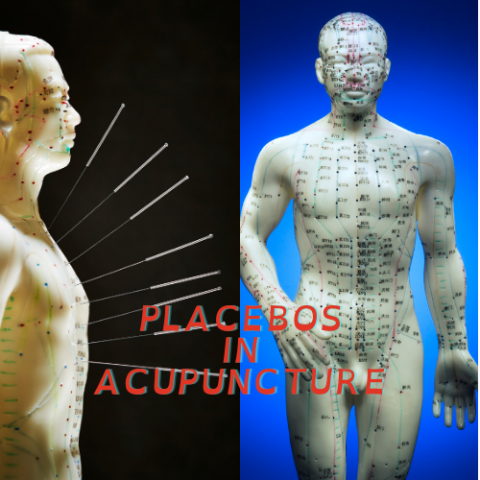Why Placebos Don't Work in Acupuncture
Have you ever heard of a research study that involved a placebo? Most people don't know what a placebo is or its function, but it is focused heavily on in medicine and research. In the western and pharmaceutical worlds, placebos are usually sugar pills that are given to a portion of people in a research group, while the other half of the group takes the pharmaceutical pill they are testing. The results are measured by the percentage the pill works against the sugar placebo. There is a set of fancy numbers they have and look at a bell curve to determine if the results can be reproduced. These are called P values: the statistical significance, in other words. Well, in the acupuncture world, there has been a fair amount of research conducted by seasoned researchers. The problem with this is that acupuncture is not like a pharmaceutical drug. It works on multiple systems of the body simultaneously. Not only this, but there is no such thing as a placebo in acupuncture, and here's why...
There are many levels of therapeutics that acupuncture works on. There are simple things we do during a treatment that stimulate only the most basic functions of the body, while other techniques acupuncturists apply are much more complicated and can access only the deepest, hidden areas of the body and stimulate the most intricate processes that we still don't understand. With research in the acupuncture field, what they will do is take half a group and give them 'real' acupuncture, and the other half 'fake' acupuncture. The fake acupuncture is the placebo group. For the 'fake' acupuncture, they will either use non-acupuncture points (points that we don't recognize as designated in our numbered, official system of acupuncture), or they will take a fake needle and press it on the skin but not penetrate the skin. Well, there are a whole lot of problems with both of these. Part of my doctoral dissertation, which is well over 100 pages, discusses how the body is sensitive to noxious stimuli; Noxious means annoying or alerting, so something that alerts the nervous system and brain. This noxious stimulation can be something small like a spider crawling on your skin or as large as a hammer hitting your hand. Regardless of the stimulation, there is an alert to the brain. Now, there are two main systems of the brain that can be stimulated. For the sake of non-biochemical, neuroscience language, I will break this down into simple terms so everyone can understand.
There are two basic areas of the brain that can be stimulated, both with acupuncture and in everyday life with spiders crawling on you or hammer accidents. There is the prefrontal cortex, which has that 'rest and digest,' relaxation effect and plays a big role in emotions and hormones. And there is the 'fight or flight,' or get-up-and-go part of your brain.Most times when any therapy is applied, or even when you know you are about to receive a therapy, that get-up-and-go part of your brain starts firing. When these research studies are occurring, they find often times that acupuncture is either slightly better, or no better than a placebo. So why is this? Well, with acupuncture, we stimulate the get-up-and-go section of your brain, and so does the placebo (again, because there is some stimulation). With 'real' acupuncture points, we can access the rest and digest section of your brain. However, this is GREATLY dependent upon the condition of the patient's body, the choice of acupuncture points for that person (customized) and the way the acupuncturists inserts the needles. If a non-acupuncturist's needles into acupuncture points without the correct knowledge of depth, angle and most importantly, the right technique (speed of insertion), then only the get-up-and-go section will be stimulated. The problem lies in the design of these studies. Placebos should not be used in acupuncture, PERIOD!
Any time a needle is inserted anywhere in the body, the body responds similarly to when you get stuck with a splinter. It is a process called The Current of Injury. Your body sends resources like red and white blood cells, anti-inflammatory cells and hormones and neurotransmitters are fired to help ease the pain in that area. So any time a placebo is used, of course there is an acute therapeutic effect! It's the band-aid version of acupuncture, but it does work! Half the time we are just trying to get people out of pain, right now; then the other half of the time we are working on keeping the pain from coming back, or whatever the treatment goal is. So these placebo studies shouldn't ever be used in acupuncture. Any time I read a placebo study with acupuncture, I can rarely take into account its validity for this reason. Not to mention the other eight or so processes that happen locally with any placebo needling. So, be careful about everything you read in regard to acupuncture. The placebo studies are not a great judge, however, that is what is written about in most of the literature. Be careful about false claims, also. Acupuncture works great for a lot of things, but it is not a miracle worker. It is a simple and clever way to correct the biochemical processes in the system to regain homeostasis.
Albert Einstein once said: "To raise new questions, new possibilities, to regard old problems from a new angle, requires creative imagination and marks real advance in science."
When you subscribe to the blog, we will send you an e-mail when there are new updates on the site so you wouldn't miss them.



Comments